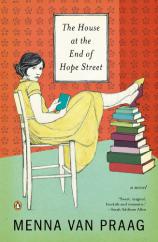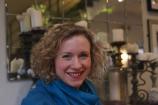Excerpt
Excerpt
The House at the End of Hope Street

The house has stood at the end of Hope Street for nearly two hundred years. It’s larger than all the others, with turrets and chimneys rising into the sky. The front garden grows wild, the long grasses scattered with cowslips, reaching toward the low-hanging leaves of the willow trees. At night the house looks like a Victorian orphanage housing a hundred despairing souls, but when the clouds part and it is lit by moonlight, the house appears to be enchanted. As if Rapunzel lives in the tower and a hundred Sleeping Beauties lie in the beds.
The house is built in red brick, the color of rust, and of Alba Ashby’s coat—a rare splash of brightness in a wardrobe of black clothes. Alba doesn’t know what she’s doing, standing on the door- step, staring at the number eleven nailed to the silver door. She’s lived in Cambridge for four of her nineteen years, but has never been down this street before. And there is no reason for her to be here now, except that she has nowhere else to go.
In the silence Alba’s thoughts, the ones she’s been trying to es- cape on her midnight walks through town, begin to circle, gathering force in her mind, ready to whip themselves into a hurricane. How did this happen? How could this happen to me? She’s always been so careful, never inviting any drama or disaster, living like a very sensible seventy-nine-year-old: in a tiny box with a tight lid.
And while most people wouldn’t achieve much under such strict limitations, Alba achieved more than most: five A-levels at fifteen, a place at King’s College, Cambridge, to read Modern His- tory, and full PhD funding at eighteen. All this by virtue of two extraordinary traits: her intelligence and her sight. At age four and a half, as well as being able to name and date all the kings and queens of England, Alba started to realize she could see things other people couldn’t: the ghost of her grandma at the breakfast table, the paw prints of long-disappeared cats in the grass, the aura of her mother moments before she entered a room. Alba could see smells drifting toward her before she smelled them and sounds vibrating in the air minutes before she heard them. So, because Alba knew things other people didn’t, they never noticed she lived her life in a box.
But ever since the worst event of Alba’s life, she’s barely been able to see anything at all, constantly tripping over pavement edges, fall- ing down steps, and walking into walls. She still hasn’t cried because to stay in shock feels safer, it keeps a distance between her and the thing she’s trying to pretend hasn’t happened. The numbness sur- rounds her, a buffer against the outside world, through which Alba can hardly breathe or see.
Today is the first of May, just after midnight. The moon is full and bright. Vines of wisteria and jasmine twist together across the red bricks, their flowers hanging over the windows and above the door. Their scent puffs through the air and, though she’s sorry she can’t see their colors, the smell begins to fill Alba with a sense of calm she’s never felt before. Her shoulders soften as she reaches up to touch the flowers hanging in wispy bunches above her head. Soon she’ll feel strong enough to walk again. But then she remembers, she no longer has anywhere to go.
In the silence Alba hears something, a low hum in the air, almost indistinguishable from the breeze. Still cupping the flowers in her palm, she listens. The hum grows louder and becomes a tune, the notes drifting toward her, and suddenly Alba is captivated. She knows the words to this song:
Sleep, sleep my sweet
Sleep and dream of butterflies . . .
The next line slips away as Alba thinks of the summer her mother sang that song, when she was eight years old, just before her father left. The tune grows louder, seeping through Alba’s skin, sending shivers down her spine. She knows she should be scared, but she’s not; she’s enchanted.
Alba steps back to look up at the house, at its rows of dark win- dows, the panes of glass glinting. For a second Alba thinks she sees a face in the window above her, a flash of white and blond that dis- appears so the night is mirrored back at her. Alongside the window grows a plant with flowers so purple they’re almost black. Its strange- ness beckons Alba to come closer, rub its leaves, smell its flowers, slide her fingers into the earth . . . The charms of the house and its garden sink deeper into Alba and, without realizing what she’s do- ing, she steps forward and rings the bell.
As Peggy Abbot scurries down the steps, pulling on her patchwork dressing gown, a picture of Alba starts to take shape in her mind: tiny and built like a boy, spiky black hair, intense blue eyes, a mouth that rarely smiles, a weight of sadness and self-doubt heavier than Peggy has ever felt before, but a sense of sight stronger even than her own. Suddenly she knows that this might be a dangerous thing indeed. The midnight glory is in bloom tonight. If Alba looks for too long she might see what makes its petals glow and, worst of all, sense what’s buried beneath it.
Wishing she were forty years younger, Peggy hurries along the hallway, slipping on the wood in her woolen socks. But she doesn’t have to worry. In her current mental state, Alba’s sense of sight is significantly dimmed so the secret is safe for now.
When the door swings open, Alba steps back in shock, staring into the face of the oldest and most beautiful woman she’s ever seen.
The House at the End of Hope Street
- Genres: Fiction, Women's Fiction
- paperback: 320 pages
- Publisher: Penguin Books
- ISBN-10: 0143124943
- ISBN-13: 9780143124948








